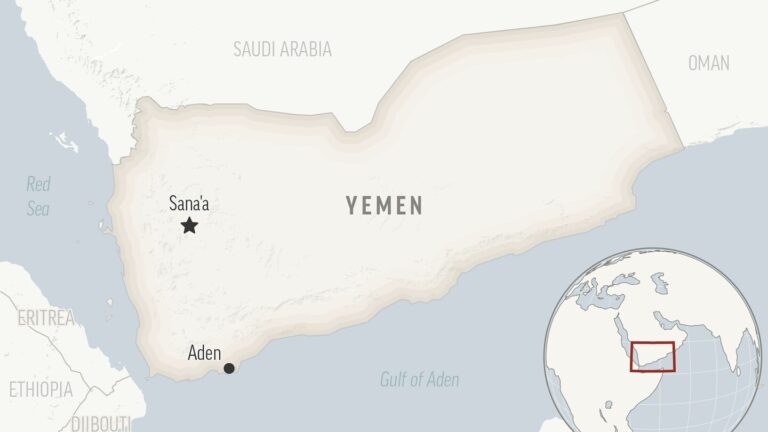DUBAI, United Arab Emirates (AP) — Eleven Yemeni staff members of a United Nations agency have been detained. Yemen’s Houthi rebels Officials said Friday the circumstances were unclear as the rebels face increasing financial pressure and airstrikes from the U.S.-led coalition. Others working for aid groups may have also been taken.
The Houthis seized control of Yemen’s capital nearly a decade ago and have been battling a Saudi-led coalition since then, but the captures Targeting ships throughout the Red Sea corridor over- The war between Israel and Hamas In the Gaza Strip.
But while it has attracted international attention, the secretive group has also cracked down on dissent at home. 44 people recently sentenced to death.
A regional official, who spoke to The Associated Press on condition of anonymity because he was not authorized to brief reporters, initially confirmed that at least nine U.N. officials had been detained. The detained staff included officials from the U.N. human rights body, its development program and the World Food Program, as well as one staff member from the U.N. special envoy’s office, the official said. The wife of one of the detained staff members has also been detained.
Associated Press correspondent Charles de Ledesma reports that Yemen’s Houthi rebels appear to be instigating the crackdown.
By Friday evening, UN spokesman Stephane Dujarric in New York confirmed that 11 UN staff members had been taken away.
“We are extremely concerned by these developments and are actively seeking clarification from the Houthi authorities about the circumstances of their detention and, above all, to ensure immediate access for UN personnel,” he told reporters. “We are therefore using all available tools to ensure the safe and unconditional release of all of them as soon as possible.”
Former staff members of the US Embassy in Sanaa, which was closed in 2015, have also been captured and are being held by the Houthis.
Mayoun Human Rights Institute, which also identified UN staff members who had been detained, named other aid organizations whose staff had been detained in four Houthi-controlled provinces: Amran, Hodeidah, Sa’ada and Sana’a.
“We condemn in the strongest terms this dangerous escalation of tensions, which violates the privileges and immunities accorded to UN personnel under international law, as a repressive, totalitarian and intimidating act aimed at obtaining political and economic gain,” the UN said in a statement.
Many of the groups mentioned did not immediately acknowledge the detentions.
One of the groups that provided the information, Save the Children, told The Associated Press that it was “concerned about the whereabouts of one of our staff members in Yemen and is doing all we can to ensure his safety and well-being,” without providing further details.
Activists and lawyers have also started an open letter online calling on the Houthis to immediately release the detainees, as not doing so would “isolate the country from the world.”
Human Rights Watch, citing family members of those detained, said “Houthi authorities have not disclosed the detainees’ whereabouts or allowed them to contact their employers or families.”
“The Houthis should immediately release UN staff and other independent organizations they are holding for their human rights and humanitarian work and end their arbitrary detentions and enforced disappearances,” said Nik Jafarnia, researcher at Human Rights Watch.
Yemen’s Houthi rebels and their media organisations made no mention of the detainees, but military spokesman Brigadier General Yahya Saree said a ship that had not been reported or seen by international authorities was attacked on Friday night. The Houthis have previously exaggerated their claims.
Iran-backed rebels also reported new U.S.-led airstrikes on Friday targeted areas around the Red Sea port city of Hodeidah and later the capital, Sanaa. Several airstrikes hit Hodeidah’s airport, according to the Houthi-controlled SABA news agency, after rebels earlier appeared to have launched attacks targeting shipping in the area.
It is unclear what exactly prompted the detentions, but a sign that the Houthis are facing a shortage of enough hard currency to support the economy in the areas they control is their move to introduce new coins for Yemen’s riyal, a move that the Yemeni government in exile in Aden and other countries have criticized as a form of counterfeiting.
Authorities in Aden have also demanded that all banks move their headquarters to Aden as a way to halt the riyal’s worst-ever decline and reassert control over the economy.
“As tensions and conflict within the country spiral out of control, Yemen could fall into complete economic collapse,” Yemeni journalist Mohammed Ali Tamer warned in an analysis published by the Carnegie Endowment for International Peace.
Bloomberg reported on Thursday that the US plans to step up economic pressure on the Houthis by cutting off their sources of revenue, including $1.5 billion that Saudi Arabia will pay to cover the salaries of government employees in rebel-held areas.
The war in Yemen has killed more than 150,000 people, including combatants and civilians, and unleashed one of the world’s worst humanitarian disasters, killing tens of thousands more. The Houthi attacks on shipping have helped to divert attention from domestic problems and the stalemated war. But the Houthis have faced increasing casualties and damage from U.S.-led airstrikes targeting them in recent months.
Thousands have been imprisoned by the Houthis during the war. Associated Press investigation Some detainees have been burned with acid, hung by their wrists for weeks, and beaten with batons, while the Houthis have recruited child soldiers and indiscriminately laid landmines during the conflict.
The Houthis have previously detained four UN staff members, two in 2021 and two more in 2023, both of whom remain in the militia’s custody. In 2023, the Office of the UN High Commissioner for Human Rights called the detentions “deeply disturbing, demonstrating a complete disregard for the rule of law.”
___
Bara Anwar reported from Riyadh, Saudi Arabia. Samy Magdy in Cairo and Michael Weissenstein at the United Nations contributed to this report.

